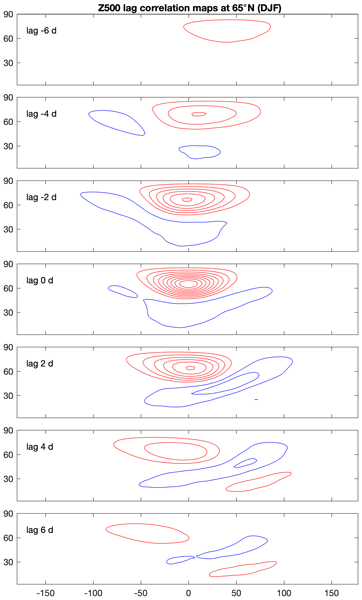The role of #RossbyWaves in polar #weather and #climate
by Tim Woollings, et al.
13 Jan 2023
Abstract:
"Recent Arctic warming has fuelled interest in the weather and climate of the polar regions and how this interacts with lower latitudes. Several interesting theories of polar-midlatitude linkages involve Rossby wave propagation as a key process even though the meridional gradient in planetary vorticity, crucial for these waves, is weak at high latitudes. Here we review some basic theory and suggest that Rossby waves can indeed explain some features of polar variability, especially when relative vorticity gradients are present.
"We suggest that large-scale polar flow can be conceptualised as a mix of geostrophic turbulence and Rossby wave propagation, as in the midlatitudes, but with the balance tipped further in favour of turbulent flow. Hence, isolated vortices often dominate but some wavelike features remain. As an example, quasi-stationary or weakly westward-propagating subpolar anomalies emerge from statistical analysis of observed data, and these are consistent with some role for wave propagation. The noted persistence of polar cyclones and anticyclones is attributed in part to the weakened effects of wave dispersion, the mechanism responsible for the decay of midlatitude anomalies in downstream development. We also suggest that the vortex-dominated nature of polar dynamics encourages the emergence of annular mode structures in principal component analyses of extratropical circulation.
"Finally, we consider how Rossby waves may be triggered from high latitudes. The linear mechanisms known to balance localised heating at lower latitudes are shown to be less efficient in the polar regions. Instead, we suggest the direct response to sea ice loss often manifests as a heat low, with radiative cooling balancing the heating. If the relative vorticity gradient is favourable this does have the potential to trigger a Rossby wave response, although this will often be weak compared to waves forced from lower latitudes."
Read more:
https://wcd.copernicus.org/articles/4/61/2023/
#Copernicus #Weather #ClimateChange #ArcticMelt #ArcticWarming #GlobalWarming #GlobalHotSpots
by Tim Woollings, et al.
13 Jan 2023
Abstract:
"Recent Arctic warming has fuelled interest in the weather and climate of the polar regions and how this interacts with lower latitudes. Several interesting theories of polar-midlatitude linkages involve Rossby wave propagation as a key process even though the meridional gradient in planetary vorticity, crucial for these waves, is weak at high latitudes. Here we review some basic theory and suggest that Rossby waves can indeed explain some features of polar variability, especially when relative vorticity gradients are present.
"We suggest that large-scale polar flow can be conceptualised as a mix of geostrophic turbulence and Rossby wave propagation, as in the midlatitudes, but with the balance tipped further in favour of turbulent flow. Hence, isolated vortices often dominate but some wavelike features remain. As an example, quasi-stationary or weakly westward-propagating subpolar anomalies emerge from statistical analysis of observed data, and these are consistent with some role for wave propagation. The noted persistence of polar cyclones and anticyclones is attributed in part to the weakened effects of wave dispersion, the mechanism responsible for the decay of midlatitude anomalies in downstream development. We also suggest that the vortex-dominated nature of polar dynamics encourages the emergence of annular mode structures in principal component analyses of extratropical circulation.
"Finally, we consider how Rossby waves may be triggered from high latitudes. The linear mechanisms known to balance localised heating at lower latitudes are shown to be less efficient in the polar regions. Instead, we suggest the direct response to sea ice loss often manifests as a heat low, with radiative cooling balancing the heating. If the relative vorticity gradient is favourable this does have the potential to trigger a Rossby wave response, although this will often be weak compared to waves forced from lower latitudes."
Read more:
https://wcd.copernicus.org/articles/4/61/2023/
#Copernicus #Weather #ClimateChange #ArcticMelt #ArcticWarming #GlobalWarming #GlobalHotSpots

The role of Rossby waves in polar weather and climate
Abstract. Recent Arctic warming has fuelled interest in the weather and climate of the polar regions and how this interacts with lower latitudes.wcd.copernicus.org
Dieser Beitrag wurde bearbeitet. (5 Monate her)
